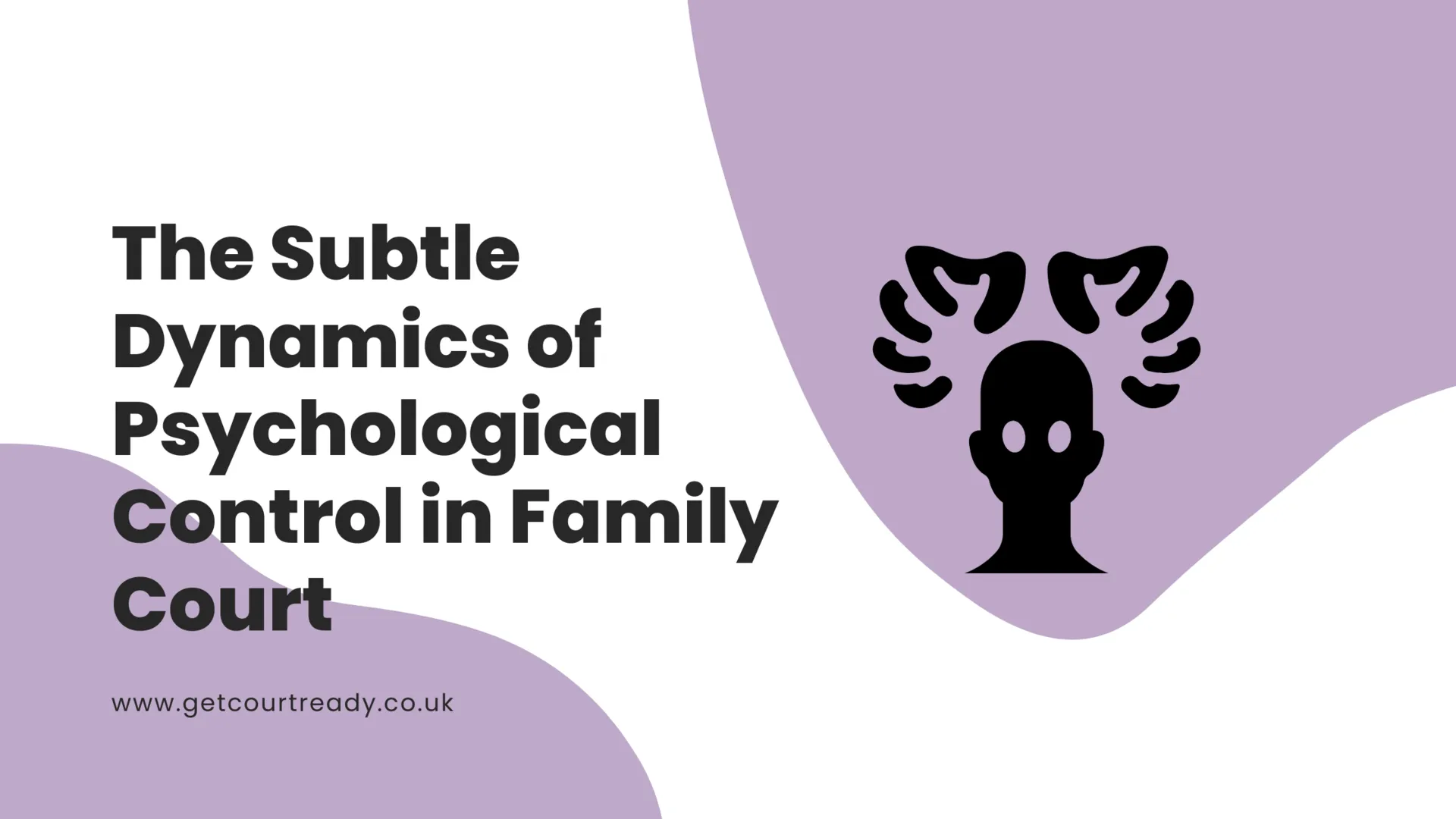Psychological control is a subtle yet pervasive form of emotional manipulation that can deeply affect family dynamics, especially during family court proceedings. Soenens & Vansteenkiste describe psychological control as a multifaceted construct that can manifest through various parental tactics. These tactics include guilt-induction, contingent love or love withdrawal, instilling anxiety, and invalidation of the child's perspective. Each of these tactics can have profound implications for children, particularly in the emotionally charged environment of family court.
Guilt-Induction and Contingent Love
Guilt-induction is a tactic where parents use guilt to pressure children into compliance. This can be particularly damaging in family court situations, where a parent may induce guilt in a child for showing affection or wanting to spend time with the other parent. Similarly, contingent love or love withdrawal involves parents making their attention and affection dependent on the child's compliance with their wishes. In family court, this can translate into a child feeling they must choose between parents to receive love and approval.
Real Life Example
The child returns home after time with their father and mother asks if they had a nice time. The child excitedly answers “yes” at which point the mother grabs their bag, shifts to an aggressive tone and tells the child to go and get changed. The child is confused as to what they did wrong. Later that day, the mother, in a short and pointed way asks the child what they did with their father. The child lists some things and the mother gets more agitated. The child, seeking to understand and establish a more harmonious state, tells the mother that “daddy shouted at me”. At this the mother hugs the child and tells them she is sorry the father treated them so badly. The child feels better and subconsciously learns that in order to receive attention, affection and to prevent the withdrawal of love, they must say something negative about their father. This continues after each interaction between the father and the mother until the mother is able to convince the child through these subtle emotional ques, that contact with their father is bad. At this point the child begins to reject the father.
Instilling Anxiety and Invalidation
Instilling anxiety is another form of psychological control where parents create fear to ensure obedience. In the context of family court, this might involve making a child anxious about the consequences of not siding with one parent over the other. Invalidation of the child's perspective involves dismissing or undermining the child's own thoughts and feelings. This can be particularly harmful during family court proceedings, as it may prevent the child from expressing their true desires regarding custody or visitation
Real Life Example
The father makes a comment to the child before going to their mother’s that he is going to miss them and be really lonely without them. The child feels guilty but once at the mother’s house, forgets about the comment and enjoys themself. Once the child returns to father, they make a snidey remark about how the child didn’t ring them to see that they were OK and that “anything could have happened to me, I could have died and you wouldn’t know”. The child feels afraid and so when they next go to their mother’s house, they ask to call dad. He deliberately doesn’t answer and the child becomes agitated, worrying something is wrong. Mother tries to reassure the child but the child won’t rest until they have made contact and so the mother feels obligated to call the father herself. He answers and asks blase, saying he must have missed the call as he was busy but when the child speaks to him, he changes his tone to sadness and the child feels anxious that something is wrong. The father does nothing to reassure the child and eventually, the child will only rest when they go to see their father and so they leave their mother early. This pattern is repeated under different guises until the child feels they can’t leave the father at all out of fear and so rejects spending time with their mother.
Manifestation of the Role-Reversal Dynamic
Psychological control of a child is a form of parenting that can have profound effects on the dynamics of the parent-child relationship. This type of control often involves a coercive and controlling parent who imposes their will on the child, sometimes to the extent that the child’s own identity and autonomy are compromised. Research has shown that this can lead to a phenomenon known as role reversal or boundary dissolution (BD), where the expected roles of parent and child become confused.
Role reversal occurs when the child is placed in an adult-like role, taking on responsibilities and emotional burdens that are typically reserved for parents. This can happen in various forms, such as parentification, where the child is expected to provide nurturance or guidance to the parent, or adultification, where the child becomes a peer or companion to the parent. These boundary violations disrupt the natural hierarchy in the family structure, leading to a reversal of roles that can be detrimental to the child’s development.
The impact of psychological control and role reversal on a child’s self-concept is significant. As noted in a study published in the Journal of Child and Family Studies, "Maternal engagement in emotional BD during reminiscing emerged as a significant predictor of less consistency in child self-concept". This suggests that when a mother engages in behaviours that blur the boundaries between her role and her child’s, it can lead to inconsistencies in how the child views themselves, potentially affecting their self-esteem and identity.
A poignant quote from the same research highlights the gravity of this issue: "Parent-child relationships are typically characterised by a parental role focused on fulfilling the child’s needs. When these expected parent-child roles break down and the child is elevated into an adult-like role charged with meeting the parent’s needs, this is called role reversal/confusion or boundary dissolution (BD)". This encapsulates the essence of the problem, where the child is thrust into a role they are not developmentally prepared for, leading to a host of potential psychological issues.
Read more about the role reversal dynamic in our blog.
The Impact on Family Court Proceedings
In family court, psychological control can significantly influence the outcomes of custody battles and parenting plans. Children may exhibit loyalty conflicts, feel pressured to align with one parent, or struggle with expressing their needs and wishes. The court must be vigilant in recognising signs of psychological control, as it can be indicative of a broader pattern of coercive and controlling behaviour. This presents as a pattern of behaviour called “alienating behaviours”. Mother’s and father’s are both capable of displaying and using these tactics, and regularly do in child arrangement proceedings. Sadly, the courts are often unable to recognise these subtle tactics and make the presumption that the child is choosing to reject the parent through their own volition. This is especially true of teenagers who they consider to be Gillick competent. However, the key point of being deemed Gillick competent is that they have capacity to express their own wishes. When a child has been psychologically manipulated and is experiencing this control, they are unable to express their own wishes and feelings out of fear of hurting, enraging and losing the parent who is exerting this control. This can then present, on the surface, as a child who is securely attached to the controlling parent when in reality it is an enmeshed relationship where the parent-child boundaries have been distorted through the role-reversal dynamic.
Conclusion
Understanding psychological control and its manifestations in family court is crucial for legal professionals, parents, and mental health practitioners. Recognising these behaviours can help protect children's emotional well-being and ensure that court decisions are made in their best interests. Psychological control can lead to a role-reversal dynamic in the parent-child relationship, which poses a risk to the child’s emotional and psychological well-being. It's essential for family courts to consider the presence of psychological control when evaluating the dynamics of parenting disputes and to take appropriate measures to safeguard the mental health of the children involved.
If you suspect your child is being psychologically controlled or is risk of being, you need a strategy to encourage the court to consider psychological control as early as possible in proceedings. This will reduce the opportunity for alienating behaviours to gather momentum and prevent severe alienation. Our Clarity Case Analysis will create this for you based on a thorough assessment of your exes behaviour, providing you with strategy recommendations to inform you legal team or your own case management if you are a Litigant in Person. Find out more at www.getcourtready.co.uk/clarity-case-analysis
FAQ’s
How can family courts effectively identify and mitigate the impact of psychological control tactics used by parents during custody disputes?
Family courts can employ several strategies to identify psychological control tactics. These include:
- Training Judges and Court Personnel: Educating those involved in family court proceedings about the signs and implications of psychological control can lead to more informed decisions.
- Utilising Expert Testimony: Mental health professionals can provide insights into the family dynamics and the potential impact of psychological control on the child.
- Child’s Voice in Court: Ensuring that the child has a safe platform to express their views, possibly through a guardian ad litem or child advocate, can help the court understand the child’s perspective without parental influence. Read about how to challenge Gillick Competence in these cases.
To mitigate the impact, courts can:
- Order Psychological Evaluations: When there’s suspicion of psychological control, a thorough evaluation by a psychologist can uncover underlying issues.
- Implement Parenting Programs: Court-mandated parenting classes that focus on healthy parenting strategies can help reduce controlling behaviours.
- Supervised Visitation: In severe cases, supervising visitation can protect the child from direct psychological manipulation.
What measures can be taken to protect children from the negative effects of guilt-induction and contingent love, especially in situations where they are required to testify or express their preferences in family court?
- Child Interview Specialists: Trained professionals can interview children in a way that minimises stress and the potential for guilt-induction.
- Neutral Environments: Conducting interviews and testimonies in child-friendly, neutral settings can help children feel more secure and less pressured.
- Supportive Counselling: Providing children with access to counselling can help them cope with the emotional turmoil of family court proceedings.
In cases of role reversal, what support systems or interventions are available to help children regain a sense of normalcy and appropriate boundaries in their relationships with their parents?
- Family Therapy: Engaging in family therapy can address boundary issues and help establish appropriate parent-child roles.
- Individual Therapy for the Child: This can help the child understand and navigate their feelings, as well as rebuild their self-concept.
- Educational Programs: Programs that educate both parents and children about healthy boundaries can prevent role reversal from occurring.


